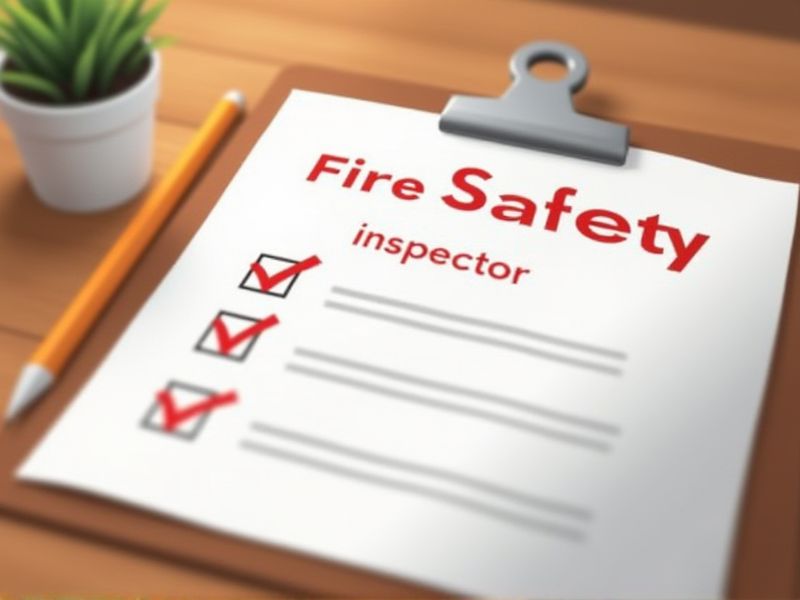
Fire safety inspectors require certain certifications to ensure they possess the technical knowledge and skills necessary to evaluate complex safety systems and regulations effectively. These certifications validate an inspector's competence, ensuring they can assess and manage fire risks in various environments, from commercial buildings to industrial facilities. Certified inspectors are also better equipped to stay updated with the latest fire safety standards and technological advancements. Some essential certifications necessary for a fire safety inspector include:
NFPA Certified Fire Inspector (CFI)
The NFPA Certified Fire Inspector (CFI) credential is crucial for ensuring that fire safety inspectors possess a comprehensive understanding of fire codes and standards. Having this certification validates an inspector's expertise in identifying potential fire hazards and enforcing compliance, which can directly reduce the risks of fire incidents. Inspectors with CFI are better equipped to conduct thorough investigations and recommend effective solutions that optimize fire safety. The credential also fosters trust and credibility with businesses and the public, encouraging adherence to fire safety regulations.
NICET Certification in Fire Protection Engineering Technology
NICET Certification in Fire Protection Engineering Technology provides a standardized measure of knowledge and competence, which enhances credibility and trust in fire safety inspectors' skills. Certification ensures inspectors are well-versed in the latest codes, standards, and best practices, leading to effective and up-to-date fire safety inspections. Fire safety inspectors with NICET certification are often more adept at identifying potential fire hazards, which contributes to reducing fire risk in various environments. The certification process encourages continuous learning and professional development, keeping inspectors current in an evolving field.
Certified Fire Protection Specialist (CFPS)
The Certified Fire Protection Specialist (CFPS) credential enhances a fire safety inspector's understanding of fire dynamics and safety protocols, ensuring they can evaluate hazards effectively. Earning CFPS provides credibility and trust, as it signifies adherence to industry-recognized standards. These specialists possess in-depth knowledge of fire protection systems, which is crucial for developing and enforcing safety regulations. The CFPS certification reflects a commitment to ongoing education and proficiency in the latest fire safety technologies and methods.
International Code Council (ICC) Certified Fire Inspector
The ICC Certified Fire Inspector ensures compliance with fire safety codes and standards, reducing the risk of fire incidents. Proper certification provides inspectors with the necessary knowledge to accurately evaluate fire safety measures. When inspections are carried out by qualified professionals, it enhances the credibility and reliability of fire safety assessments. Certified inspectors play a crucial role in educating building owners about potential hazards and necessary safety improvements.
OSHA Fire Safety Certification
OSHA Fire Safety Certification equips fire safety inspectors with essential skills to identify and mitigate workplace fire hazards. Certification ensures compliance with federal regulations, reducing the risk of penalties and enhancing organizational safety. Trained inspectors can effectively implement fire prevention and emergency response plans, minimizing fire-related incidents. Certification reinforces credibility and trust, as organizations prioritize inspectors who adhere to standardized safety practices.
Fire Officer Certification
Fire officer certification builds a foundational understanding of fire safety protocols, crucial for a fire safety inspector. Certification ensures inspectors are knowledgeable about evolving fire codes and standards, reducing potential safety risks. It equips inspectors with critical skills in risk assessment and emergency planning, integral to preventing fire-related incidents. Certified fire safety inspectors demonstrate proficiency that fosters trust and compliance among stakeholders, minimizing liability issues.
Certified Safety Professional (CSP)
Certified Safety Professional (CSP) certification enhances a fire safety inspector's credibility and ensures adherence to stringent safety standards. It provides comprehensive training in risk assessment and hazard control, essential for identifying fire-related threats. With CSP credentials, inspectors are more equipped to implement effective safety protocols and reduce potential fire incidents. Employers often prefer CSP-certified inspectors for their proven expertise and dedication to maintaining a safe environment.
FEMA Emergency Management Institute Certification
The FEMA Emergency Management Institute Certification equips fire safety inspectors with essential knowledge in disaster response protocols, enhancing their effectiveness in emergency situations. Certification ensures inspectors are well-versed in national standards, fostering consistency and professionalism in fire safety assessments. Understanding emergency management principles through FEMA training enables inspectors to better identify potential hazards and develop comprehensive safety plans. This certification also promotes collaboration with other emergency response teams, improving overall efficiency during fire-related incidents.
HAZWOPER (Hazardous Waste Operations and Emergency Response) Certification
The HAZWOPER Certification ensures that fire safety inspectors are equipped to handle hazardous substances safely, a critical skill in situations involving chemical spills or toxic materials. It provides them with the necessary training to assess and manage risks associated with hazardous waste sites. Certification also enhances their ability to respond effectively to emergency situations, reducing potential harm to themselves and the public. By understanding hazardous materials protocols, they can ensure compliance with safety regulations during inspections.
Building Construction & Fire Protection Systems Certification
Building Construction & Fire Protection Systems Certification equips fire safety inspectors with in-depth knowledge of building codes and fire safety regulations. This certification enhances their ability to identify potential fire hazards in various structural environments, ensuring compliance with safety standards. Inspectors can effectively evaluate and suggest improvements on fire protection systems, such as alarms and sprinklers. The certification ensures that inspectors are up-to-date with the latest fire safety technologies and practices, increasing overall safety for building occupants.
Summary
You gain greater trust from employers and clients when a Fire Safety Inspector holds certifications. Certification ensures that you access updated knowledge and skills, improving inspection accuracy. This expertise enhances your ability to identify potential hazards, reducing fire risks. Such qualifications also increase your career advancement opportunities by making you more competitive in the job market.
